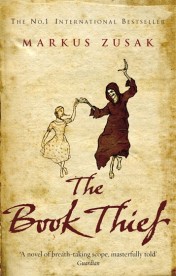‘Thanks for the beautiful review […] all best and much respect.’
Markus Zusak, 2013 (via Twitter)
Narrated by Death – not something that can be said about most novels; however, Zusak pulls it off wonderfully. A dry sense of humour, short and blunt sentences, as well an interaction with the reader are all characteristics which make Death the perfect narrator for The Book Thief.
The book thief is Liesel Meminger, a German girl, who is delivered to the house of Hans and Rosa Hubermann at the start of the novel. En route, she encounters Death for the first time, following the loss of her brother. We are told that they will meet each other on two further occasions.
The first book stolen by Liesel is a gravedigger’s manual which she gathers up from the snow after her brother’s burial. She goes on to steal several others, which she studies religiously; she later learns to read and write, with the aid of her Papa, Hans, with whom she shares a very close bond.
We get a better idea of the mysterious Hubermanns, when they selflessly take in and hide Max Vandenburg, a Jewish fist-fighter. Liesel develops a close friendship with Max, who is likewise a victim of Nazi persecution. The literature produced by Max for his friend Liesel truly enforces the novel’s emphasis on words, particularly in regards to their strength and importance at a time of great oppression and loneliness, where many people desperately desired to escape and rebel.
One of those who rebels is Rudy, a school-friend of Liesel, who, one day, dresses up like Jesse Owens and sprints through the streets of Molching. His affection shared with Liesel, and his constant pestering for just one kiss, makes for a beautiful, yet heart-breaking love story in The Book Thief.
Zusak places us in Himmel Road, at the centre of Nazi influence in Germany, allowing us to witness the suffering of innocent Germans, both at the hands of the British, who bombard the city in air raids, and of their fellow countrymen, who march shackled Jews through the streets to concentration camps.
My only real criticism would be the use of the German pejoratives saumensch and saukerl, which I felt lost their meaning through overuse. However, I feel that with this gem, Zusak has produced one of the most excellent novels of our century – sheer brilliance and originality – and one that I would steal, given the chance.


